

Coming of the American Revolution: The Formation of the Sons of Liberty. Colonial agents working in Britain express their concerns over the Stamp Act long before it is passed by Parliament on 1 March 1765.
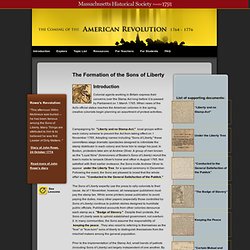
When news of the Act's official status reaches the American colonies in the spring, creative colonists begin planning an assortment of protest activities. Campaigning for "Liberty and no Stamp-Act," local groups within each colony scheme to prevent the Act from taking effect on 1 November 1765. Adopting names including "Sons of Liberty," these committees stage dramatic spectacles designed to intimidate the stamp distributor in each colony and force him to resign his post. In Boston, protestors take aim at Andrew Oliver. Adams Electronic Archive : Correspondence between John and Abigail Adams. Gale U.S. History In Context - Home. The Sons of Liberty. In Boston in early summer of 1765 a group of shopkeepers and artisans who called themselves The Loyal Nine, began preparing for agitation against the Stamp Act.
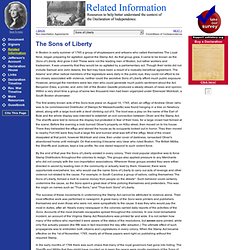
As that group grew, it came to be known as the Sons of Liberty. And grow it did! These were not the leading men of Boston, but rather workers and tradesmen. It was unseemly that they would be so agitated by a parliamentary act. Though their ranks did not include Samuel and John Adams, the fact may have been a result of a mutually beneficial agreement. The first widely known acts of the Sons took place on August 14, 1765, when an effigy of Andrew Oliver (who was to be commissioned Distributor of Stamps for Massachusetts) was found hanging in a tree on Newbury street, along with a large boot with a devil climbing out of it.
Sons of Liberty: Patriots or Terrorists? By Todd Alan Kreamer SONS OF LIBERTY, or Sons of something altogether different?
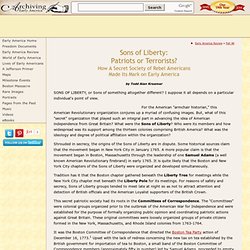
I suppose it all depends on a particular individual's point of view. For the American "armchair historian," this American Revolutionary organization conjures up a myriad of confusing images. But, what of this "secret" organization that played such an integral part in advancing the idea of American independence from Great Britain? The Boston Massacre. "The Bloody Massacre" engraving by Paul Revere.
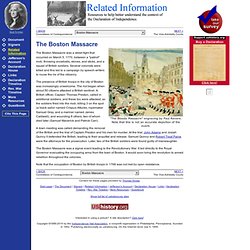
Note that this is not an accurate depiction of the event. The Boston Massacre was a street fight that occurred on March 5, 1770, between a "patriot" mob, throwing snowballs, stones, and sticks, and a squad of British soldiers. Several colonists were killed and this led to a campaign by speech-writers to rouse the ire of the citizenry. An Eyewitness Account of the Boston Tea Party. As Told By George Hewes On a bright cold moonlit evening on December 16, 1773 a group of sixty colonists boarded three British ships in Boston Harbor.
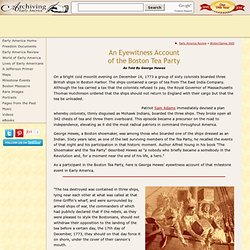
The ships contained a cargo of tea from The East India Company. Although the tea carried a tax that the colonists refused to pay, the Royal Governor of Massachusetts Thomas Hutchinson ordered that the ships should not return to England with their cargo but that the tea be unloaded. Patriot Sam Adams immediately devised a plan whereby colonists, thinly disguised as Mohawk Indians, boarded the three ships. They broke open all 342 chests of tea and threw them overboard. George Hewes, a Boston shoemaker, was among those who boarded one of the ships dressed as an Indian. As a participant in the Boston Tea Party, here is George Hewes' eyewitness account of that milestone event in Early America. Samuel Adams. Samuel Adams, One of the US's Founding Fathers.
Samuel Adams’s skills as an organizer first became apparent in 1764, when Adams publicly opposed the Sugar Act.
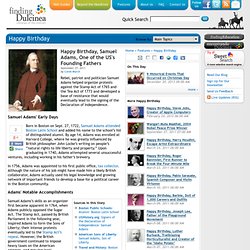
The Stamp Act, passed by British Parliament in the following year, inspired Adams to form the Sons of Liberty; their intense protests eventually led to the Stamp Act’s repeal. However, the British government continued to impose heavy taxes on the American colonies, and growing local resentment eventually led to the Boston Massacre. This catalyzing event gave Adams the confidence to publicly encourage unified resistance against the British. In 1773, the increased tea taxes defined by the Tea Act brought colonial rage to a boiling point. That November, Adams gave the go-ahead to a group of some 50 organized men who raided the British merchant ship the Dartmouth, dumping the ship’s tea cargo into Boston Harbor. Classics of American Political and Constitutional Thought: Origins through ... - Scott J. Hammond, Kevin R. Hardwick, Howard Leslie Lubert. Destiny Quest. Google Scholar. Sweet Search.
Gale - Enter Product Login. Student Research Center - powered by EBSCOhost: Basic Search. Historical Newspapers. History Study Center - Home Page. Gale U.S. History In Context - Home. eLibrary Search. Sign In.